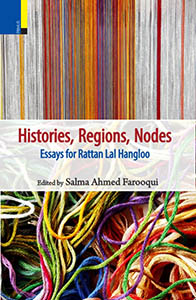
Histories, Regions, Nodes: Essays for Rattan Lal Hangloo
EDITOR- Salma Ahmed Farooqui
| HB ₹1195 . $64.95 . ₤52.95 |
e-Book ₹1095 . $58.95. ₤48.95 |
|
INFORMATION
- EDITOR : Salma Ahmed Farooqui
- HB ISBN : 978-93-84092-83-2
- EBOOK ISBN : 978-93-84092-85-6
- Year : 2017
- Extent : 346 pp.
- Discount available on checkout
- Usually dispatched within 3 to 5 working days.
INFORMATION
- AUTHOR –
- ISBN – 978-93-84092-83-2
- Year – 2017
- Extent: 400 + 40 coloured illustrations
- 10% discount + free shipping
- Usually dispatched within 3 to 5 working days.
The volume Histories, Regions, Nodes is a collection of eighteen essays that brings together assorted opinions and issues raised by scholars on themes related to trade and urbanization, art, architecture and popular culture, religion and ideology, historiography, nature of state, status of women, diplomacy and ethnic conflict in remote parts of India. Contributed by scholars who have known Professor Rattan Lal Hangloo over the years, these essays deliberate upon political, cultural and economic aspects of history to which Professor Hangloo as a historian has contributed.
The medieval Indian State, Central Asian affairs, Indian diaspora and contemporary politics in Kashmir are areas that have interested Professor Hangloo throughout. His wide-ranging research and forthright views as well as his lasting contribution to the discipline of history and beyond enunciate an academic spirit that cuts across many boundaries.
The Editor
Salma Ahmed Farooqui is Professor-cum-Director at the H.K. Sherwani Centre for Deccan Studies at the Maulana Azad National Urdu University, Hyderabad. Her inclination for research has led to several publications which include seven books and research papers in medieval Indian history and history of the Deccan. She has presented papers at national and international conferences which include University of Cambridge; University of California, Santa Barbara; New York University’s campus in Florence; the University of Hawaii; at institutes in Sarajevo and Istanbul; and the Free University of Berlin. She is recipient of the Fulbright-Nehru International Education Administrators Seminar in 2013 and the Study of the United States Institutes Program in 2010 at the Department of Religious Studies, University of California, Santa Barbara.
The volume Histories, Regions, Nodes is a collection of eighteen essays that brings together assorted opinions and issues raised by scholars on themes related to trade and urbanization, art, architecture and popular culture, religion and ideology, historiography, nature of state, status of women, diplomacy and ethnic conflict in remote parts of India. Contributed by scholars who have known Professor Rattan Lal Hangloo over the years, these essays deliberate upon political, cultural and economic aspects of history to which Professor Hangloo as a historian has contributed.
The medieval Indian State, Central Asian affairs, Indian diaspora and contemporary politics in Kashmir are areas that have interested Professor Hangloo throughout. His wide-ranging research and forthright views as well as his lasting contribution to the discipline of history and beyond enunciate an academic spirit that cuts across many boundaries.
The Editor
Salma Ahmed Farooqui is Professor-cum-Director at the H.K. Sherwani Centre for Deccan Studies at the Maulana Azad National Urdu University, Hyderabad. Her inclination for research has led to several publications which include seven books and research papers in medieval Indian history and history of the Deccan. She has presented papers at national and international conferences which include University of Cambridge; University of California, Santa Barbara; New York University’s campus in Florence; the University of Hawaii; at institutes in Sarajevo and Istanbul; and the Free University of Berlin. She is recipient of the Fulbright-Nehru International Education Administrators Seminar in 2013 and the Study of the United States Institutes Program in 2010 at the Department of Religious Studies, University of California, Santa Barbara.
Table of Contents
Table of Contents
| Introduction Salma Ahmed Farooqui | 1-13 |
| Part I : Historiographical Thought | |
|---|---|
| Between Two Worlds: Faith And Reason In Medieval India Najaf Haider | 17-27 |
| Ideas Of Nation: Sir Syed’s Qaum And Bankim’s Vande Mataram Tabir Kalamn | 28-39 |
| The Needham–Hora Controversy: Disagreements Over The Chronology And Approach To The History Of Science Dhruv Raina | 40-52 |
| Challenges And Emerging Trends In Indian Historiography Sanjay Kumar | 53-66 |
| Port Cities And The Historian Rila Mukherjee | 67-81 |
| Against Colonial Periodization: The Mautam Intervention Malsawmdawngli Ana | 82-88 |
| Part II: Regional Connotations | |
| High-Tin Bronzes In Megalithic Culture Sharada Srinivasan | 91-100 |
| Trade Routes And Commercial Networks In Deccan-Marathwada During Seventeenth And Eighteenth Centuries Bina Sengar | 101-112 |
| Trade, Ports And Urbanization: A Study Of Colonial Urban Space Of Coastal Andhra In The Seventeenth And Eighteenth Centuries A. Subash |
113-121 |
| Labour Relations Through Religious Literature: Seventeenth-Century Maharashtra Radhika Seshan | 122-129 |
| Deccani Art—Influences And Identity: The Miniature Paintings Of Hyderabad B. Lavanya | 130-149 |
| ‘Persianisation’ Of The Deccan: Tracing Foreign Influences In The Architecture Of Medieval Deccan Salil Kader | 150-173 |
| Performing Popular Culture In Medieval Andhra S. Victor Babu | 174-201 |
| Situating Hyderabad State In Eighteenth-Century India: Some Perspectives G. Naga Sridhar | 202-225 |
| State And Urban Society In Orissa During The Maratha Rule, 1751–1803 Pramod Kumar Mohanty | 226-237 |
| Craving For Companionate Wives: Male Reformers, Women’s Journals And Domestic Ideology In Andhra, 1883–1950 Shaik Mahaboob Basha | 238-280 |
| Understanding Sheikh Mohammad Abdullah: Quit Kashmir Movement, 1931–1947 Nyla Ali Khan | 281-291 |
| Sikh Dalits’ Diaspora In North-East India: Experiences From Shillong And GuwahatiHimadri Banerjee | 292-325 |
| Notes On Editor And Contributors | 327-330 |
| Index | 331-339 |




